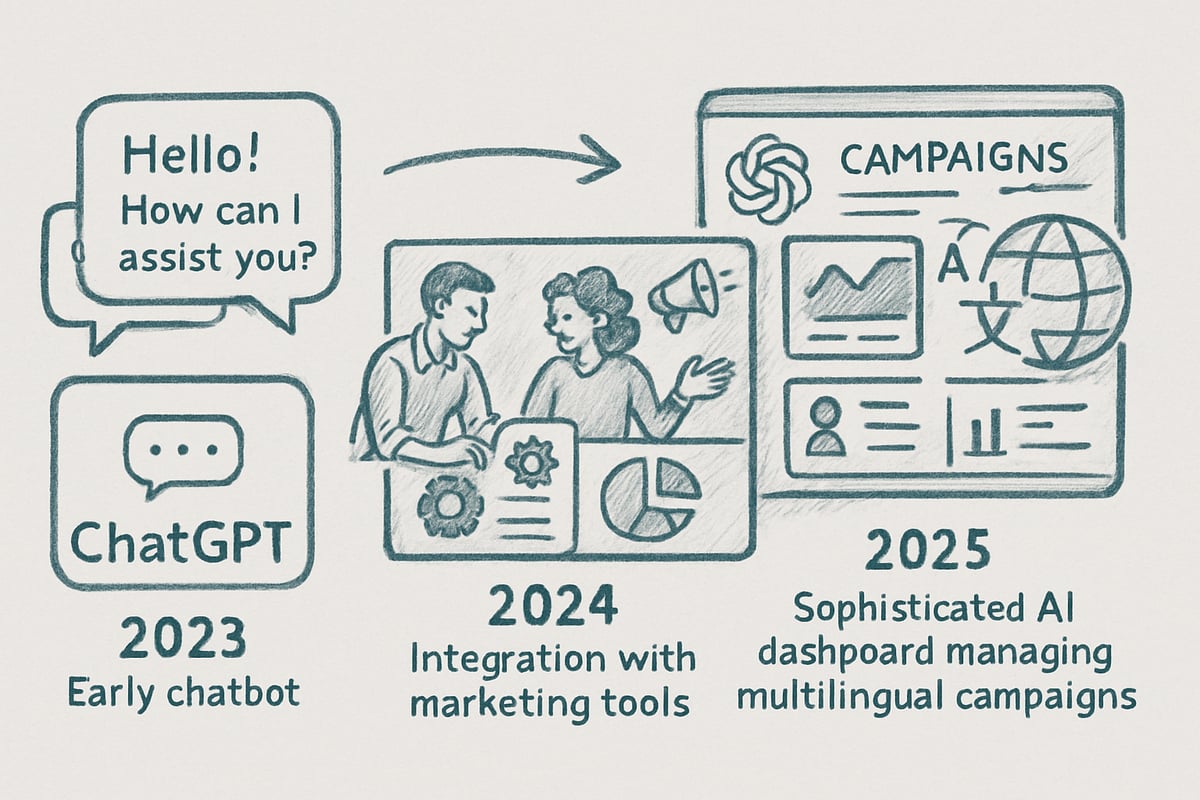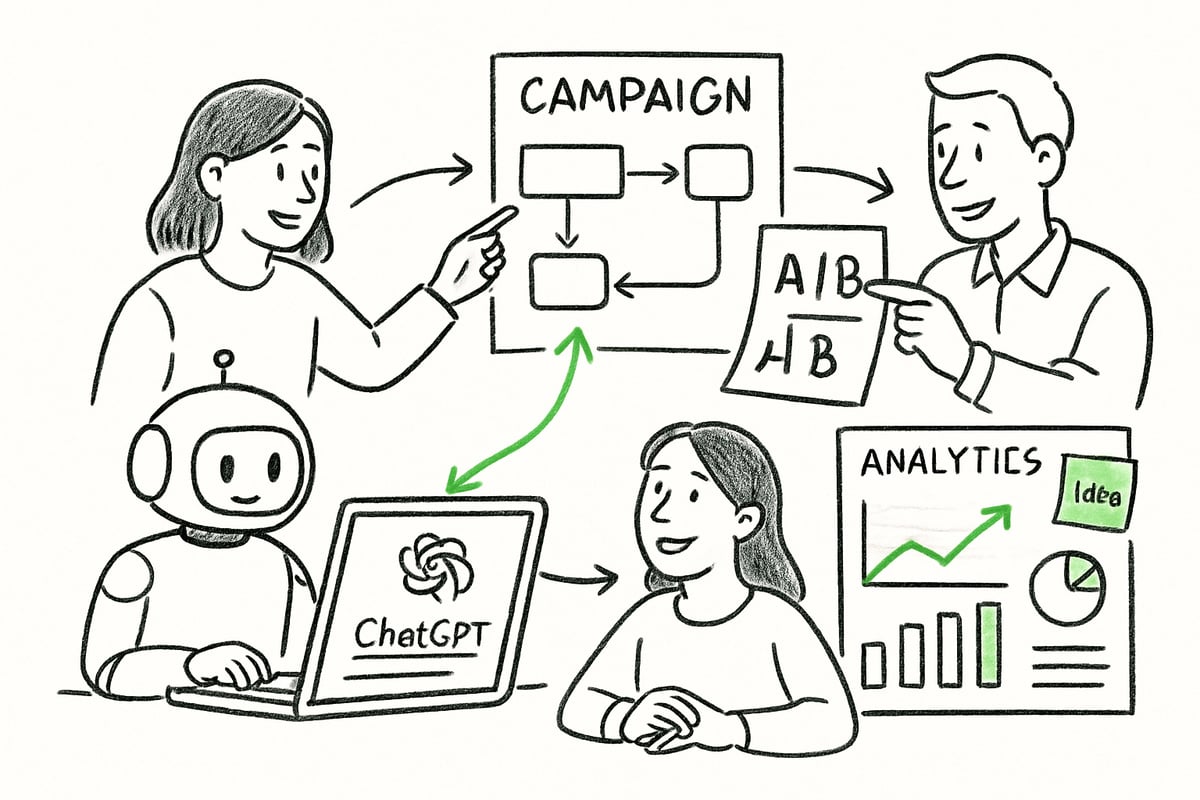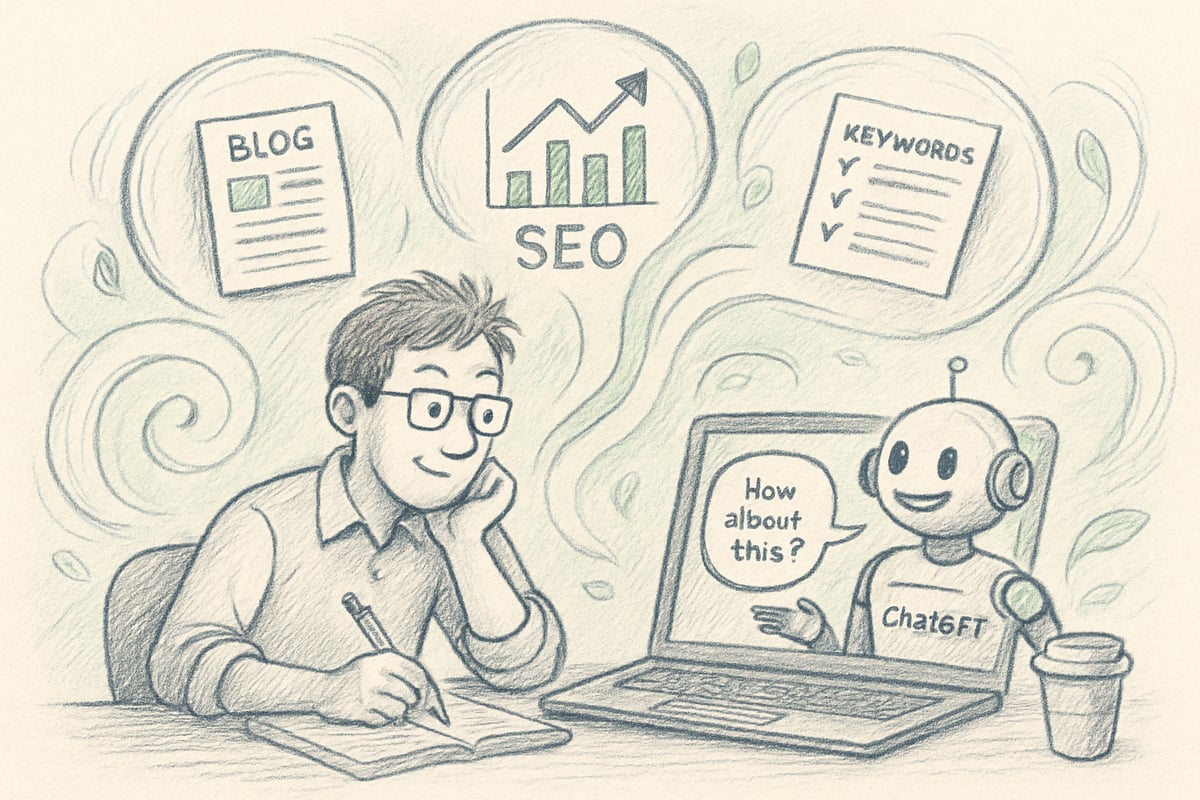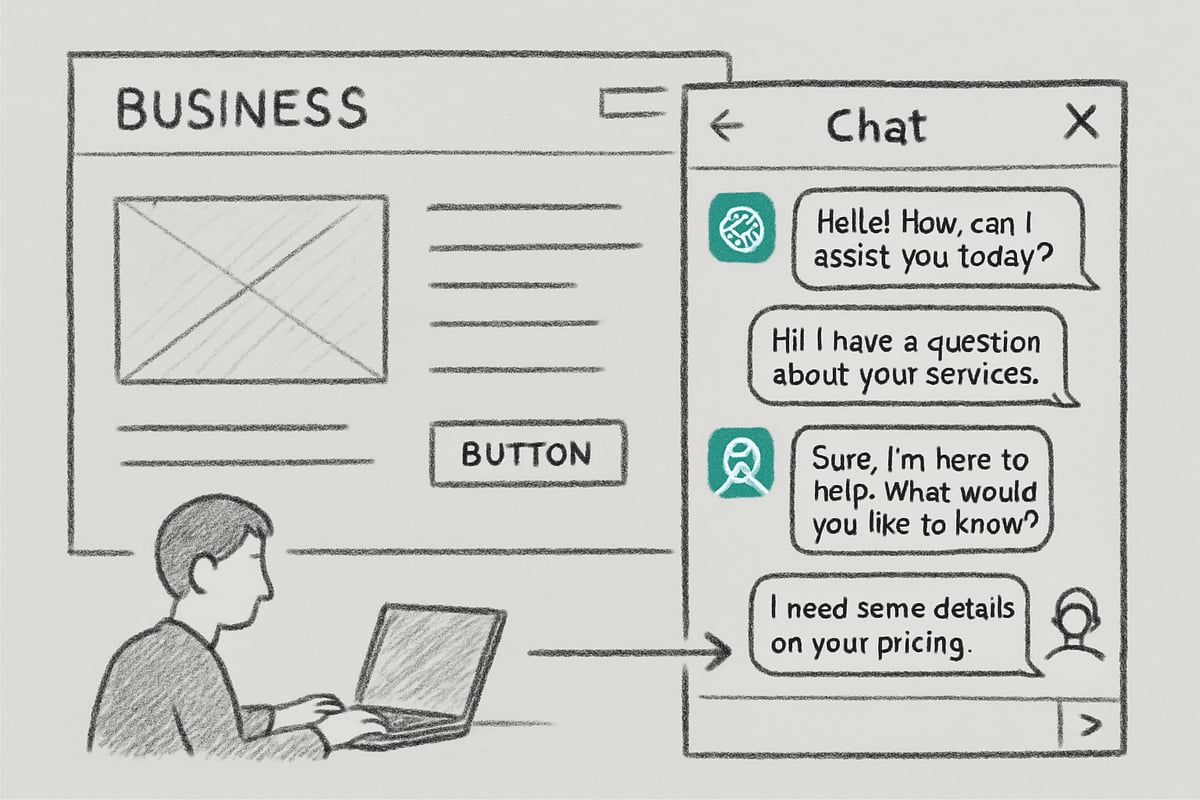The rise of generative AI has transformed digital marketing, making headlines and reshaping strategies across every industry. In 2025, chatgpt for marketers is not just a trend, but a vital resource for campaign creation, customer engagement, and content strategy.
This essential guide is designed to equip marketing professionals with actionable strategies and expert insights. Discover how ChatGPT can boost campaign optimization, streamline content creation, enhance SEO, and elevate customer experiences.
Ready to unlock time-saving, creative, and measurable marketing results? Mastering ChatGPT is your key to staying ahead in a rapidly evolving digital landscape.
The Evolution of ChatGPT: What Marketers Need to Know in 2025
The last two years have marked a dramatic transformation in the digital marketing landscape, with chatgpt for marketers moving from a cutting-edge experiment to an everyday essential. In 2023, marketers cautiously explored generative AI for content ideas and basic automation. By 2025, ChatGPT has become a strategic powerhouse, directly shaping how brands develop campaigns, personalize messaging, and analyze results.
One of the most significant milestones in this evolution has been ChatGPT’s seamless integration with leading marketing platforms. From CRMs and email providers to analytics dashboards and ad networks, the technology now connects effortlessly across the marketing stack. This connectivity allows chatgpt for marketers to automate complex workflows, generate reports, and even adjust campaigns in real time based on performance data.
Generative AI has rapidly shifted from being a novelty to serving as a core infrastructure for marketing teams. Where initial versions struggled with limited context and language support, today’s ChatGPT models offer robust multilingual capabilities, nuanced tone adaptation, and advanced personalization. For example, in 2023, most campaigns were limited to English or a handful of major languages. Now in 2025, marketers easily launch multilingual campaigns that resonate locally, giving global brands a competitive edge.
ChatGPT for marketers is now relied upon for every stage of the creative and analytical process. Marketers use it to brainstorm campaign ideas, automate repetitive tasks, and analyze audience responses. The technology’s improved language understanding means it can interpret nuanced prompts, deliver tailored content variations, and provide actionable insights for campaign optimization.
Adoption rates have soared as marketers recognize the measurable impact of generative AI. According to recent statistics, over 60% of B2B marketers now cite AI as a primary driver of lead generation—proof of ChatGPT’s growing influence. For a deeper dive into the rapid expansion and statistics behind this trend, see ChatGPT's rapid user growth.
This evolution is not just a result of technological breakthroughs. It is also fueled by marketers’ increasing demand for tools that drive efficiency and spark creativity. As chatgpt for marketers continues to advance, the focus is shifting from simple automation to strategic differentiation, helping brands stand out in a crowded digital space.
Looking ahead, chatgpt for marketers is positioned as an indispensable ally. Its ability to adapt, personalize, and analyze at scale empowers marketing professionals to innovate faster and make data-driven decisions with confidence. The journey from experimental tool to marketing cornerstone highlights the importance of embracing AI-driven strategies for long-term success.

Step-by-Step: How to Use ChatGPT for Campaign Optimization
Optimizing campaigns with chatgpt for marketers has transformed how professionals approach digital strategy. By following a structured process, you can achieve faster results, higher engagement, and smarter decision-making. Here is a practical, step-by-step guide to unlock the full potential of chatgpt for marketers in 2025.

Step 1: Define Campaign Goals and Target Audience
Start by clarifying your campaign objectives and identifying your ideal audience. Use chatgpt for marketers to generate detailed audience personas, considering demographics, interests, and pain points.
Ask ChatGPT to suggest audience segments or to summarize key motivations for each group. This sets a solid foundation and ensures your messaging will be relevant and targeted from the outset.
Step 2: Brainstorm Campaign Concepts and Messaging
Once your audience is defined, use chatgpt for marketers to brainstorm creative campaign concepts and messaging variations. Input your campaign brief and request multiple taglines, hooks, or value propositions.
Experiment with different tones and approaches to see which align best with your brand and objectives. ChatGPT can quickly provide a range of ideas, helping you break through creative roadblocks and spark new directions.
Step 3: Create A/B Test Variants for Copy and Visuals
A/B testing is essential for refining your campaign’s effectiveness. Leverage chatgpt for marketers to generate variants of subject lines, ad copy, calls-to-action, and even visual concepts.
Provide context for each test, such as audience segment or platform, to receive tailored suggestions. This step accelerates the creative process and ensures you have enough options to test and optimize.
Step 4: Analyze ChatGPT’s Suggestions for Optimization
Review the suggestions generated by chatgpt for marketers. Analyze each variant’s strengths and potential weaknesses. Use ChatGPT to compare options and recommend the most promising directions based on your goals.
Marketers report up to 30 percent faster turnaround when using AI for campaign optimization. Specific, detailed prompts lead to more actionable and creative outputs at this stage.
Step 5: Implement and Monitor Campaign Performance
Once your top-performing variants are selected, launch your campaign and use chatgpt for marketers to assist with ongoing analysis. Ask ChatGPT for insights on performance trends, optimization tips, and creative alternatives as results come in.
For a deeper dive into workflow automation and efficiency, consider exploring marketing automation strategies that complement ChatGPT’s capabilities.
Example: Iterative Refinement in Action
Marketers now routinely refine campaigns by asking chatgpt for marketers for new ideas, optimization tips, and alternative approaches. Each iteration brings you closer to higher engagement and ROI.
Remember, ChatGPT is a powerful shortcut for idea generation, but your expertise is crucial for final decisions. Combine AI-driven suggestions with your market knowledge for the best outcomes.
Content Creation and SEO: Maximizing Organic Reach with ChatGPT
The landscape of content marketing has changed dramatically with the rise of chatgpt for marketers. In 2025, this tool is at the core of how professionals create, optimize, and scale content for SEO. Marketers no longer need to spend hours brainstorming topics or manually researching keywords. Instead, ChatGPT now serves as a strategic partner, driving both creativity and efficiency in digital content production.

Accelerated Content Ideation and SEO Optimization
One of the most powerful aspects of chatgpt for marketers is its ability to rapidly generate content ideas tailored to specific audiences and business goals. Simply inputting a few prompts can yield dozens of relevant blog topics, outlines, and creative briefs. This not only saves time but also ensures that content is aligned with current trends and audience interests.
ChatGPT analyzes industry data, trending keywords, and competitor strategies to suggest high-impact topics. For example, a marketer can request a list of blog ideas targeting a particular audience segment or niche. The tool can also structure complete outlines, including suggested headings, subtopics, and calls to action.
Keyword research is another area where chatgpt for marketers excels. Using advanced language models, ChatGPT identifies not only primary keywords but also valuable synonyms and long-tail variations. This supports a robust SEO strategy, increasing the chances of ranking for a wider range of search queries. As a practical example, some marketers have used ChatGPT to analyze the content of leading industry sites, like OpenAI.com, to discover untapped keyword opportunities and semantic variations.
Drafting High-Quality Content at Scale
Drafting engaging, on-brand articles is now faster and more consistent with chatgpt for marketers. The tool can generate entire first drafts of blog posts, product descriptions, and meta tags in seconds. Marketers can instruct ChatGPT to match their brand’s tone and style, ensuring that every piece of content feels authentic and cohesive.
Overcoming writer’s block has become much easier. When inspiration stalls, marketers can prompt ChatGPT for fresh angles, catchy headlines, or new approaches to evergreen topics. This creative boost allows teams to maintain a steady publishing cadence, even with limited resources.
Scaling content production is another major advantage. ChatGPT enables marketers to develop multiple content pieces simultaneously, all while maintaining quality. Teams can quickly adapt content for different formats, languages, or platforms, broadening their organic reach and capturing new audiences.
Here’s a quick comparison highlighting the evolution of ChatGPT’s SEO capabilities:
| Feature | ChatGPT 2023 | ChatGPT 2025 |
|---|---|---|
| Language Support | Limited | Robust, Multilingual |
| Keyword Discovery | Basic | Advanced, Contextual |
| Content Outlines | Simple | Detailed, SEO-Focused |
| Tone Customization | Limited | Highly Adaptable |
Combining ChatGPT with SEO Tools and Human Expertise
While chatgpt for marketers offers tremendous value, it works best when combined with traditional SEO tools and human review. AI can suggest keywords and draft content, but skilled marketers are needed to validate accuracy, refine messaging, and align with brand guidelines.
For example, many teams pair ChatGPT outputs with platforms like SEMRush or Moz to ensure keyword choices meet search intent and comply with SEO best practices. Collaborative workflows, where human editors review and enhance ChatGPT drafts, deliver the highest-quality results.
Data shows that over 60% of B2B marketers now cite SEO and organic traffic as their main lead sources, according to HubSpot. This underscores the importance of using every available advantage, including AI, to stay ahead in search rankings.
If you are looking to expand your toolkit, consider exploring AI tools for marketing success, which can further amplify the benefits of chatgpt for marketers when used together.
Ultimately, the most effective strategies blend AI-driven content creation with the expertise of seasoned marketers. This partnership ensures content is not only optimized for search engines but also resonates with real audiences and supports long-term growth.
Enhancing Customer Experience and Support with ChatGPT
The customer experience landscape has transformed dramatically with the rise of chatgpt for marketers. In 2025, brands are expected to deliver immediate, personalized support across every channel. ChatGPT’s natural language abilities now allow marketers to provide 24/7 assistance, answering questions and resolving issues with efficiency that was unimaginable just a few years ago.

ChatGPT-powered chatbots have become a cornerstone for chatgpt for marketers, enabling automated FAQ handling, order tracking, and troubleshooting. These bots integrate seamlessly with websites, mobile apps, and social platforms, offering natural and context-aware interactions. Marketers can now design workflows where simple queries are resolved instantly, while more complex issues are smoothly handed over to human agents. This approach not only improves response times but also boosts customer satisfaction.
The ability of chatgpt for marketers to analyze and summarize customer interactions is a game changer. AI systems can now detect sentiment, flag urgent complaints, and generate concise summaries for support teams. For example, when a customer expresses frustration, ChatGPT offers a helpful response and, if necessary, escalates the issue to a live agent for personal attention. Despite these advances, 84% of consumers remain cautious about AI in customer service, emphasizing the need for transparency and careful oversight.
The true value of chatgpt for marketers is in saving time on routine queries, allowing teams to focus on strategy and relationship-building. By combining AI-driven support with human empathy, brands create a balanced customer experience. For a broader perspective on how these innovations fit into the evolving marketing landscape, explore Artificial intelligence in marketing. Ultimately, the most effective marketers use ChatGPT to augment—not replace—the human touch, ensuring every customer feels seen and valued.
Creative Strategy & Advertising: Generating Compelling Copy and Concepts
In the rapidly evolving world of digital marketing, creative strategy is the heartbeat of successful campaigns. Marketers face constant pressure to produce compelling copy and fresh advertising concepts that stand out in crowded channels. With the rise of chatgpt for marketers, the creative process has entered a new era of efficiency and innovation.
Why Creativity Matters in 2025
Modern consumers are bombarded with thousands of messages daily. To break through the noise, brands must deliver original, relevant, and emotionally resonant content. This is where chatgpt for marketers has become a transformative tool. By leveraging advanced AI, marketers can generate a wealth of ideas, headlines, and campaign themes in minutes rather than days.
How ChatGPT for Marketers Drives Copywriting Innovation
ChatGPT for marketers excels at brainstorming and iterating creative assets. With carefully crafted prompts, marketers can request multiple versions of ad copy, social posts, and even video scripts. Consider the following practical uses:
- Generating dozens of unique email subject lines for A/B testing
- Creating catchy social media captions tailored for different platforms
- Brainstorming alternative headlines for digital ads or landing pages
The power of chatgpt for marketers lies in its ability to instantly provide fresh perspectives and expand the creative pool. This not only saves time, but also fosters experimentation with tone, style, and messaging.
| Prompt Example | Output Example |
|---|---|
| "Write 5 playful ad headlines for a new energy drink" | 1. "Boost Your Day the Fun Way" 2. "Sip, Smile, Repeat" 3. "Fuel Up and Go Farther" 4. "Unleash Your Inner Dynamo" 5. "Refresh, Recharge, Reimagine" |
| "Suggest three Instagram captions for a product launch" | 1. "Meet your new must-have" 2. "Ready, set, launch" 3. "The future just dropped" |
Prompt Engineering and Testing Variations
Success with chatgpt for marketers depends on the specificity of your prompts. The more details you provide about your audience, brand voice, and campaign goals, the more relevant and innovative the outputs. Marketers routinely test different wording, emotional angles, and calls to action, then select top-performing options for further refinement.
For example, an email marketing team might use ChatGPT to develop several subject lines, then run A/B tests to see which message drives higher open rates. This rapid iteration accelerates campaign launches and increases the odds of resonating with target audiences.
Efficiency and Best Practices
Marketers who embrace chatgpt for marketers report more efficient creative workflows. AI-powered brainstorming can free up time for strategic thinking and big-picture planning. According to industry data, teams leveraging AI in their creative process consistently achieve faster turnaround and more diverse campaign concepts.
To maximize results, combine AI-generated ideas with human insight and brand expertise. Always review outputs for tone and relevance. For a deeper look at integrating creativity with automation, visit Marketing and automation insights.
Human Creativity Remains Essential
While chatgpt for marketers is a powerful springboard for generating copy and concepts, it should not replace the human touch. The best campaigns blend AI efficiency with marketer intuition, empathy, and cultural awareness. By thoughtfully integrating AI into creative strategy, marketers can achieve measurable gains while maintaining authenticity.
Analytics, Personalization, and Ethical Considerations in 2025
The rise of chatgpt for marketers has transformed how brands approach analytics and personalization in 2025. With AI now embedded in every stage of the marketing funnel, teams can access actionable insights and automate complex tasks that once took hours or even days.
Today, chatgpt for marketers is not just about generating content. It powers advanced data analysis, campaign reporting, and real-time trend spotting. Marketers can use prompts to automatically segment audiences, identify high-value leads, and create personalized messaging at scale. This shift has made it possible to respond instantly to changing market trends and consumer preferences.
A typical workflow might look like this:
- Feed campaign data into ChatGPT for marketers
- Receive automated reports highlighting top-performing segments
- Get recommendations for personalized content and next steps
- Adjust campaigns in real time based on AI-driven insights
According to ChatGPT's market influence in 2025, companies using these AI-powered analytics tools are seeing measurable gains in engagement and ROI. Marketers report faster turnaround and higher conversion rates as a direct result of AI integration.
Personalization has reached new heights. ChatGPT for marketers now enables hyper-targeted recommendations, from product suggestions to tailored email content, all while maintaining a consistent brand voice. The ability to analyze millions of data points instantly means marketers can deliver the right message to the right audience at exactly the right time.
However, this power comes with responsibility. Ethical considerations are more important than ever. Marketers must ensure data privacy, avoid intrusive personalization, and remain transparent about AI usage. Issues such as bias in training data or unintended privacy breaches can erode trust and result in regulatory scrutiny.
For instance, ChatGPT's limitations and considerations highlight the ongoing need for human oversight. Marketers should monitor AI outputs for accuracy, fairness, and compliance with evolving regulations. Documenting how chatgpt for marketers is used in decision-making processes helps maintain accountability and transparency.
In summary, chatgpt for marketers has become a core driver of analytics and personalization in 2025. By combining AI-powered insights with ethical best practices, marketers can achieve real-time optimization and build lasting customer relationships. The future belongs to those who leverage these tools wisely, always balancing innovation with responsibility.
Future Trends: The Next Frontier for ChatGPT in Marketing
The landscape of chatgpt for marketers is on the verge of dramatic transformation as we look toward the next wave of AI-powered marketing. In 2025, the integration of ChatGPT has moved beyond simple automation, evolving into a strategic asset that drives innovation across every touchpoint.
Marketers are now leveraging chatgpt for marketers to streamline campaign management, automate audience segmentation, and deliver hyper-personalized messaging. AI-driven workflows allow teams to optimize campaigns in real time, adapting strategies based on live data and shifting consumer behaviors. This level of agility has become essential for brands seeking to maintain a competitive edge.
Emerging technologies are further expanding the possibilities for chatgpt for marketers. Integration with augmented and virtual reality platforms is opening new doors for immersive brand experiences. Imagine launching interactive AR campaigns powered by ChatGPT, where users engage with products in a virtual space and receive personalized recommendations through natural language conversations.
Voice search and smart assistants are also transforming how marketers reach consumers. ChatGPT’s advanced language models enable seamless voice interactions, allowing brands to provide instant answers, support, and content through smart speakers and in-app assistants. Real-time data feeds enable marketers to trigger timely, context-aware responses, keeping engagement relevant and dynamic.
Early adopters are already orchestrating cross-channel campaigns using chatgpt for marketers as the connective tissue between channels. For example, a marketer might use ChatGPT to analyze data from social media, email, and website interactions, then adjust messaging for each platform based on real-time insights. This omnichannel approach ensures consistent, tailored experiences at every stage of the customer journey.
According to industry surveys, AI marketing investments continue to grow at a double-digit pace, reflecting the increasing reliance on chatgpt for marketers to drive measurable business outcomes. For a deeper dive into how organizations are integrating ChatGPT and seeing significant productivity gains, see this ChatGPT's role in business and professional use.
To stay ahead, marketers must prioritize continuous learning and upskilling. Experimentation with prompt engineering, data analysis, and creative applications of AI will separate leaders from laggards. The future belongs to those who can blend human ingenuity with the evolving capabilities of chatgpt for marketers, aligning strategy with the ever-changing AI landscape.
